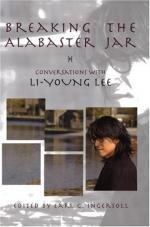|
This section contains 6,329 words (approx. 22 pages at 300 words per page) |

|
SOURCE: "Inheritance and Invention in Li-Young Lee's Poetry," in MELUS, Vol. 21, No. 1, Spring, 1996, pp. 113-32.
In the essay below, Zhou contends that "Li-Young Lee's poems enact and embody the processes of poetic innovation and identity invention beyond the boundaries of any single cultural heritage or ethnic identity."
Li-Young Lee's two prize-winning books of poetry, Rose (1986) and The City in Which I Love You (1990), contain processes of self-exploration and self-invention through memories of life in exile and experiences of disconnection, dispossession, and alienation. While providing him with a frame of reference to explore the self, autobiographical materials in his poems also serve as a point of departure for Lee to re-define and re-create the self as an immigrant in America and as a poet. At the same time, the process of Lee's construction and invention of identity is accompanied by his development of a set of poetic strategies through...
|
This section contains 6,329 words (approx. 22 pages at 300 words per page) |

|


